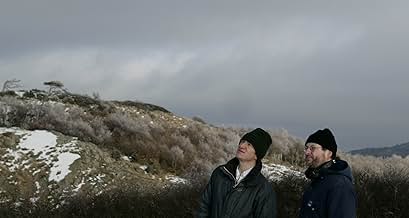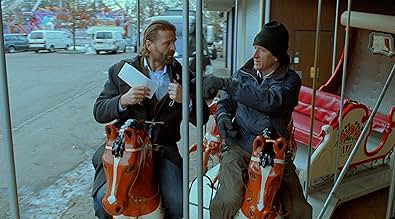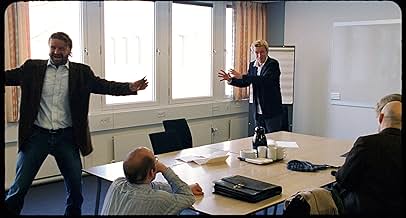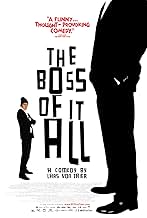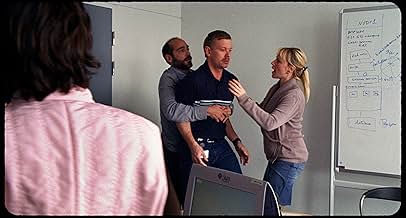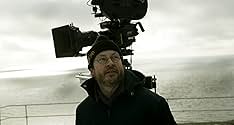IMDb रेटिंग
6.6/10
13 हज़ार
आपकी रेटिंग
अपनी भाषा में प्लॉट जोड़ेंAn IT company hires an actor to serve as the company's president in order to help the business get sold to a cranky Icelander.An IT company hires an actor to serve as the company's president in order to help the business get sold to a cranky Icelander.An IT company hires an actor to serve as the company's president in order to help the business get sold to a cranky Icelander.
- पुरस्कार
- 1 जीत और कुल 7 नामांकन
Friðrik Þór Friðriksson
- Finnur
- (as Fridrik Thor Fridriksson)
Lars von Trier
- Narrator
- (बिना क्रेडिट के)
फ़ीचर्ड समीक्षाएं
What a wonderful surprise this film was! I never expected a pretty straightforward satire from von Trier and Dogme, but I certainly got it. The plot sounds well-used and obvious but the way it was transferred to a Scandinavian IT culture, the distanced approach to character writing, improvisation, and superb acting and direction made it a great comedy. On reflection, what was really hilarious was the massively over-inflated self-importance of each and every character. Ali G. and Borat could learn a few things from these Danes (and one very irate Icelander).
As the end credits voice-over said, "Apologies to those who expected more, and to those who expected less. The others got what they deserved". I was glad to be one of the others.
As the end credits voice-over said, "Apologies to those who expected more, and to those who expected less. The others got what they deserved". I was glad to be one of the others.
In Lars von Trier's small-scale, Automavision (computer-edited) Danish-language film comedy Ravm (Peter Gantzler) is the spineless (but mean) CEO of an IT company. He's such a people-pleaser he's hidden his real rank all along so the staff won't resent his more unpopular decisions. Now on the verge of selling the company out from under them, he calls in a "self-important, out-of-work" actor, Kristoffer (Jens Albinus) to play the role of "boss of it all"—be his front man by proxy to sign the papers. Lars himself pops up at the middle and end as a voice and at the beginning as a voice and a reflection—just long enough to mock himself and us. He also makes fun of Danes for their sentimentality and giggling and chatter, and, because the buyers of the company are Icelandic, he makes fun of Icelanders for their over-reliance on their ancient sagas and their petulant rages.
Americans don't take a beating this time, though there's one American member of the company cadre, Spencer (Jean-Marc Barr) who's completely ineffectual around the office because he can't finish a sentence in Danish. Lars has lots of fun with actors here, and of course with offices and corporate manipulations. Kristoffer has some kind of quixotic idol called Gambini whose "masterpiece" is a droning monologue of a chimney sweep. He puts soot on his forehead for luck when embarking on his role. As the boss, previously known to staff via e-mails only as Svend E., Kristoffer is completely inept, but the six-person startup cadre members nonetheless react to him as if he were the real deal and are variously ready to beat up, have sex with, or marry him. The women act like woman (with especially nice turns by Iben Hjejle and Mia Lyhne), and the men act like children. They weren't even meant to see him: that's just the first thing that goes wrong—due to the actor's excessive zeal, he goes and introduces himself. As he gets in deeper and deeper—with zero preparation—he finds himself constantly begging Ravm for secret coaching sessions "on neutral ground" (which includes the zoo). But these do nothing to limit his amazing ability to gum up the works for everybody, especially Ravm. Things turn farcical when Finnur's lawyer shows up and turns out to be Kristoffer's ex-wife, Kisser (Sofie Grabol). Will she give away the game?
This all makes a lot of sense if you've seen Von Trier's earlier film, the semi-documentary The Five Obstructions (2003), in which he and his film-making mentor Jørgen Leth teamed up to provide, indirectly, a kind of skeleton-key to his mind. The Dogme film-making "vow of chastity" reflects von Trier's own masochistic, Brechtian, but—given the grimness of some of his film content—surprisingly playful need to be forever imposing new rules and limitations that challenge actor, filmmaker, and audience. The Five Obstructions, where the director spars with mentor Leth, shows that he's also an affectionate and modest tease. "Although you can see my reflection, this film won't be worth a moment's reflection," is his personal opener to The Boss of It All.
That "moment's reflection" von Trier says we won't need suggests on the contrary how reflexive and clever all this actually is. The film, which could be seen as a sort of droll, deadpan parody of "The Office" (though von Trier says he hasn't even seen the TV series), is a set of characters and premises that create their own movie, just as the computer editing device does. And just as we're startled and appalled at times by the ugliness of shifting light and sound levels and pointless jump cuts the Automavision produced, von Trier and his actors may have been surprised at how some of the set-ups turned out. Will Svend, AKA Kristoffer, sign over the company to the growling Icelander, Finnur (Fridrik Thor Fridriksson)? Even he doesn't know. He has to "consult" his "character." And that makes him, like Lars, a big tease. 'The Boss of It All' may be more intriguing than funny—and there will be those, primed too intensely by 'Dogville' and 'Manderlay,' who'll see it as merely cruel and misanthropic, but it's a complete change from his recent stuff, and yet utterly in character.
Americans don't take a beating this time, though there's one American member of the company cadre, Spencer (Jean-Marc Barr) who's completely ineffectual around the office because he can't finish a sentence in Danish. Lars has lots of fun with actors here, and of course with offices and corporate manipulations. Kristoffer has some kind of quixotic idol called Gambini whose "masterpiece" is a droning monologue of a chimney sweep. He puts soot on his forehead for luck when embarking on his role. As the boss, previously known to staff via e-mails only as Svend E., Kristoffer is completely inept, but the six-person startup cadre members nonetheless react to him as if he were the real deal and are variously ready to beat up, have sex with, or marry him. The women act like woman (with especially nice turns by Iben Hjejle and Mia Lyhne), and the men act like children. They weren't even meant to see him: that's just the first thing that goes wrong—due to the actor's excessive zeal, he goes and introduces himself. As he gets in deeper and deeper—with zero preparation—he finds himself constantly begging Ravm for secret coaching sessions "on neutral ground" (which includes the zoo). But these do nothing to limit his amazing ability to gum up the works for everybody, especially Ravm. Things turn farcical when Finnur's lawyer shows up and turns out to be Kristoffer's ex-wife, Kisser (Sofie Grabol). Will she give away the game?
This all makes a lot of sense if you've seen Von Trier's earlier film, the semi-documentary The Five Obstructions (2003), in which he and his film-making mentor Jørgen Leth teamed up to provide, indirectly, a kind of skeleton-key to his mind. The Dogme film-making "vow of chastity" reflects von Trier's own masochistic, Brechtian, but—given the grimness of some of his film content—surprisingly playful need to be forever imposing new rules and limitations that challenge actor, filmmaker, and audience. The Five Obstructions, where the director spars with mentor Leth, shows that he's also an affectionate and modest tease. "Although you can see my reflection, this film won't be worth a moment's reflection," is his personal opener to The Boss of It All.
That "moment's reflection" von Trier says we won't need suggests on the contrary how reflexive and clever all this actually is. The film, which could be seen as a sort of droll, deadpan parody of "The Office" (though von Trier says he hasn't even seen the TV series), is a set of characters and premises that create their own movie, just as the computer editing device does. And just as we're startled and appalled at times by the ugliness of shifting light and sound levels and pointless jump cuts the Automavision produced, von Trier and his actors may have been surprised at how some of the set-ups turned out. Will Svend, AKA Kristoffer, sign over the company to the growling Icelander, Finnur (Fridrik Thor Fridriksson)? Even he doesn't know. He has to "consult" his "character." And that makes him, like Lars, a big tease. 'The Boss of It All' may be more intriguing than funny—and there will be those, primed too intensely by 'Dogville' and 'Manderlay,' who'll see it as merely cruel and misanthropic, but it's a complete change from his recent stuff, and yet utterly in character.
Lars von Trier has done a modern comedy that gives (me) associations to the plays of the Norwegian-Danish comedy writer Ludvig Holberg (1684-1754). Even if it is a comedy and Lars von Trier himself in the start of the movie tells we can lean back and enjoy being entertained, the film has a message that - if you are open to it - will give you something to think about regarding moral and ethics. Like all good movies this has a surprisingly ending. "The Boss of it all" has divided the audience in Denmark in 2 groups a group who absolutely dislikes the movie and a group which is rather enchanted with it. As you can understand I belong to the last group.
The Danish lawyer Ravn (Peter Gantzler) owns the high technology company IT that he founded with the money he borrowed from his six directors. However, he invented a fictitious and powerful president named "The Boss of It All" to cover the unpopular policies of the company with the employees. When he decides to sell up the company to the Icelandic entrepreneur Finnur (Fridrik Thor Fridriksson), the buyer demands to negotiate directly with the president of IT. Ravn hires the unemployed actor Kristoffer (Jen Albinus), who is a fan of the actor Antonio Gambini, to perform the role of president of IT under a contract of confidentiality. Along the days, Kristoffer gets close to and emotionally involved with the employees of IT. Sooner he finds that the lawyer of Finnur is his ex-wife that tells him that Ravn is tricking his colleague that will lose their jobs and rights. Kristoffer tries to persuade Ravn to confess his business to the co-workers until he finds that Finnur is also a fan of Gambini.
The witty "Direktøren for det Hele" is a surrealistic dark humor comedy of Lars von Trier with a funny story of greed and vanity. I am a big fan of this director and I liked this movie, but I lost many jokes since I am not familiarized with Danish humor and culture. The conclusion is very sarcastic and I believe not easy to be understood. My vote is seven.
Title (Brazil): "O Grande Chefe" ("The Big Boss")
The witty "Direktøren for det Hele" is a surrealistic dark humor comedy of Lars von Trier with a funny story of greed and vanity. I am a big fan of this director and I liked this movie, but I lost many jokes since I am not familiarized with Danish humor and culture. The conclusion is very sarcastic and I believe not easy to be understood. My vote is seven.
Title (Brazil): "O Grande Chefe" ("The Big Boss")
I think if Von Trier's name wasn't attached to the project the people commenting might me more willing to accept this brilliant comedy. If you watch this expecting Manderlay, Dancer in the Dark, or even The Idiots, you will be disappointed. One gets the feeling from the narration (done by Von Trier himself, or at least someone speaking directly for him) this was a one off for Von Trier;a film meant to cleanse his pallet before he sinks his teeth back into American Democracy. But by taking himself less seriously he's made one of the best films of his career. I saw this at the Pusan International Film Festival and it was one of the 2 best films I saw the entire week. A couple times I was close to tears.
क्या आपको पता है
- ट्रिवियाThis movie is shot with camera technique called Automavision, an innovation in which the camera angles and movements are selected by a computer. The media notes explain technique, "a principle for shooting film developed with the intention of limiting human influence by inviting chance in from the cold". There are odd framings and jump cuts within scenes making everything seem a bit unsettled.
- कनेक्शनFeatured in Smagsdommerne: एपिसोड #4.16 (2006)
टॉप पसंद
रेटिंग देने के लिए साइन-इन करें और वैयक्तिकृत सुझावों के लिए वॉचलिस्ट करें
विवरण
बॉक्स ऑफ़िस
- बजट
- €30,00,000(अनुमानित)
- US और कनाडा में सकल
- $51,548
- US और कनाडा में पहले सप्ताह में कुल कमाई
- $7,855
- 27 मई 2007
- दुनिया भर में सकल
- $31,11,395
- चलने की अवधि
- 1 घं 39 मि(99 min)
- रंग
- ध्वनि मिश्रण
- पक्ष अनुपात
- 1.85 : 1
इस पेज में योगदान दें
किसी बदलाव का सुझाव दें या अनुपलब्ध कॉन्टेंट जोड़ें


